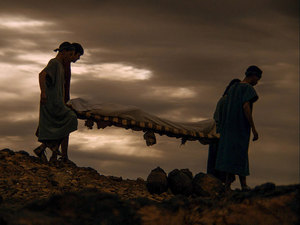Spices and Linen
[John 19:38-42]
1.
And now after these things.
All is finished.
Jesus is dead.
The grain of wheat falls to the ground.
It dies.
Hope and life are yet to be born.
2.
And a disciple, a secret one faces fear with his own act of compassion.
Joseph of Arimathea was afraid of others: of power and custom.
Afraid of walking this way of discipleship.
But he faced power in approaching Pilate.
He embraced the responsibility of custom in seeking permission to bury Jesus.
There was a garden near by. A suitable spot.
He wants to humanise the inhumane.
3.
Permission is granted.
He comes.
He removes the body.
He bears its weight.
He reaches up and embraces him.
The shadows have lengthened.
Is the world hushed?
The clamour has died away.
Do some watch and wait?
Mockery replaced by witness?
The one who saw has testified to all that has taken place.
He tells the truth.
4.
Joseph is not alone.
Nicodemus comes too. One night he had talked at length - teacher to teacher - about the nature of rebirth in the Spirit. Now we brings spices to a grave.
They bear the weight of Jesus dead body together.
Perhaps they did not know until now what their conviction meant.
Why had they sought him out?
Was it just the authority of his teaching?
Or something more than that they came to see - at night and in secret?
This is a final act of love.
Walking. Carrying. Tending.
Did they have time to wash and wipe away blood and spittle?
Moving openly now, perhaps. It is finished.
5.
There in that garden a new tomb.
They laid him there.
It was near by.
It was the day of preparation.
6.
They had taken the body.
They had wrapped it with spices.
Nicodemus had brought a weight of myrrh and aloes.
This takes time.
They can’t be furtive and hasty: this wrapping in linen demands patience and care.
Final acts demand their own ritual and dignity.
Are their hearts numbed by pain; the eyes spent of tears.
7.
They are not alone.
Others are wracked by grief too.
His mother and the beloved disciple; his mother’s sister, the wife of Clopas and Mary Magdalene.
These women who’d stood by: watching, waiting and wounded.
Joseph and Nicodemus bear the weight.
Placing the lifeless body in a tomb.
Death.
Death is real.
Here, today, the love of God descends to its very depths.
Flesh enters this long sleep, yet is not putrified.
We long for sin’s power to break; for death to pass from us too.
8
And in this light we wait.
With the wounded and the faithful.
An uncertain breaking in of dawn. Perhaps.
In the moment that Christ is laid in a tomb, something is beginning.
Moist with one drop of Thy blood, my dry soul.
Salute the last and everlasting day.
This tomb holds one who descends to the depths.
Those who carry his body, shift out of view.
Yet this tomb is straining already: slowly rising.
Life-less yet life-like.
This is not darkness nor dazzling: this light a setting sun or breaking dawn.
So God loved the world.
He sent his Son.
Not to condemn the world.
Might our tears be washed away; might our darkness lighten? Will we return to a crown of prayer and praise?
The Word was made flesh.
Dwelt among us.
Flogged, mocked and pierced.
Wrapped in linen and spices.
God loved us so much, his Word became flesh.
His Word gave up his breath, and breathed out his spirit.
What do we see as we watch and wait?
Here is Death. Whom his death slew.
An Afterward
Salute the last, and everlasting day,
Joy at the uprising of this Sunne, and Sonne,
Ye whose just tears, or tribulation
Have purely washed, or burnt your drossy clay;
Behold the Highest, parting hence away,
Lightens the dark clouds, which he treads upon,
Nor doth he by ascending, show alone,
But first he, and he first enters the way.
O strong Ram which hast battered heaven for me,
Mild lamb, which with thy blood, hast marked the path;
Bright Torch, which shin'st, that I the way may see,
Oh, with thy own blood quench thy own just wrath.
And if the holy Spirit, my Muse did raise,
Deign at my hands this crown of prayer and praise.
An Afterward
© Julie Gittoes 2017



